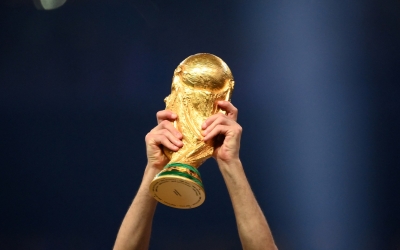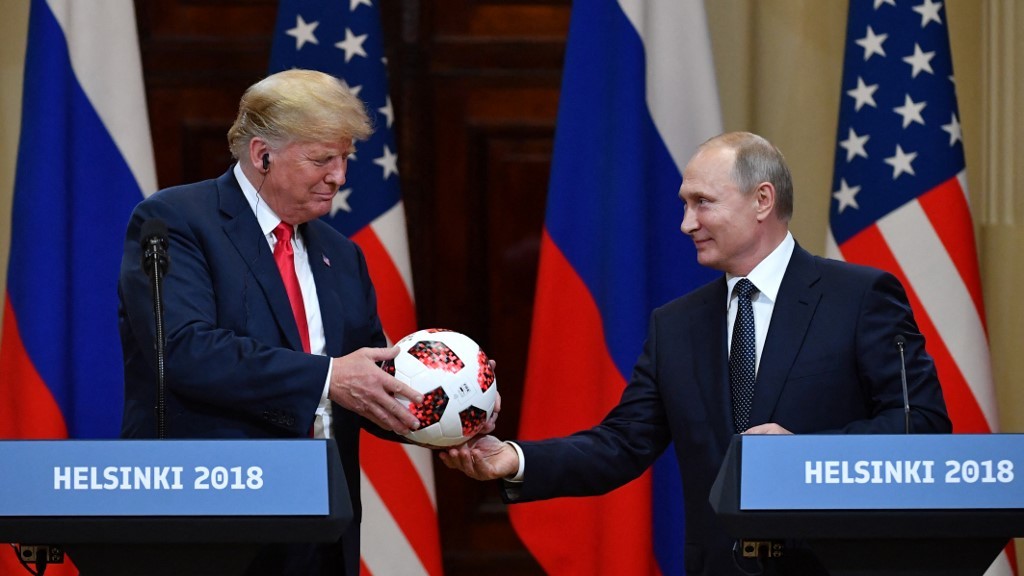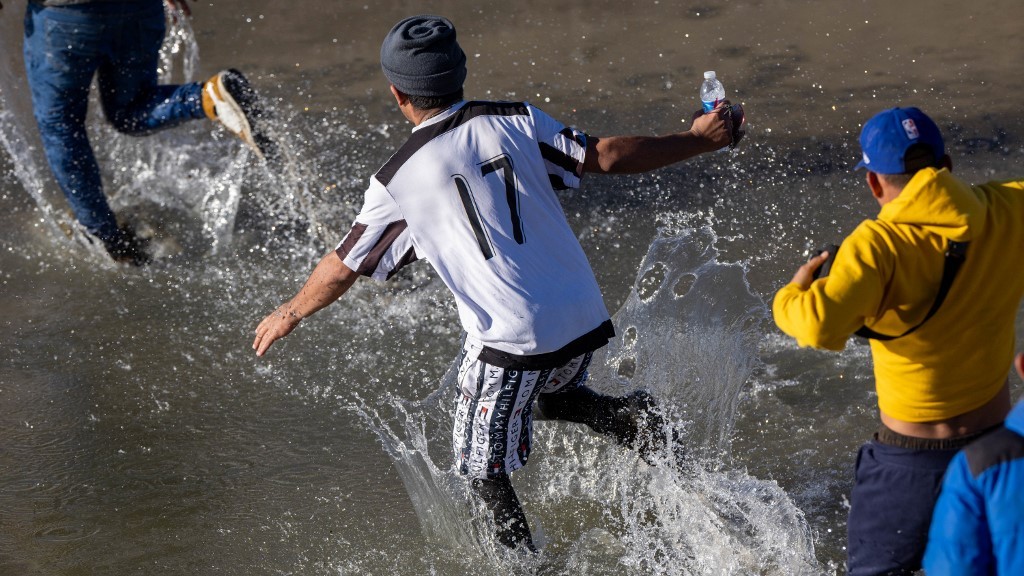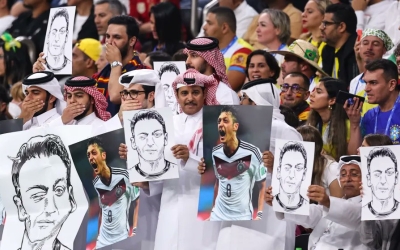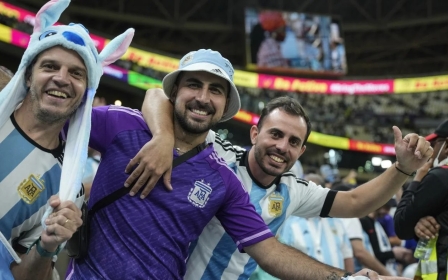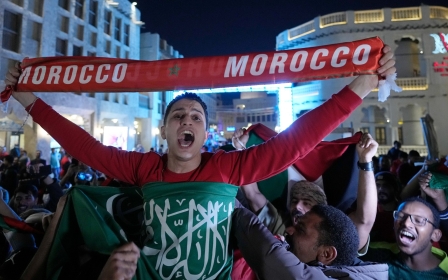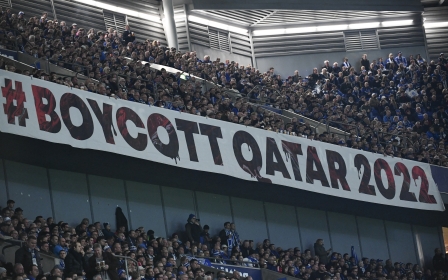World Cup 2026: Will the US face the same kind of scorn as Qatar?
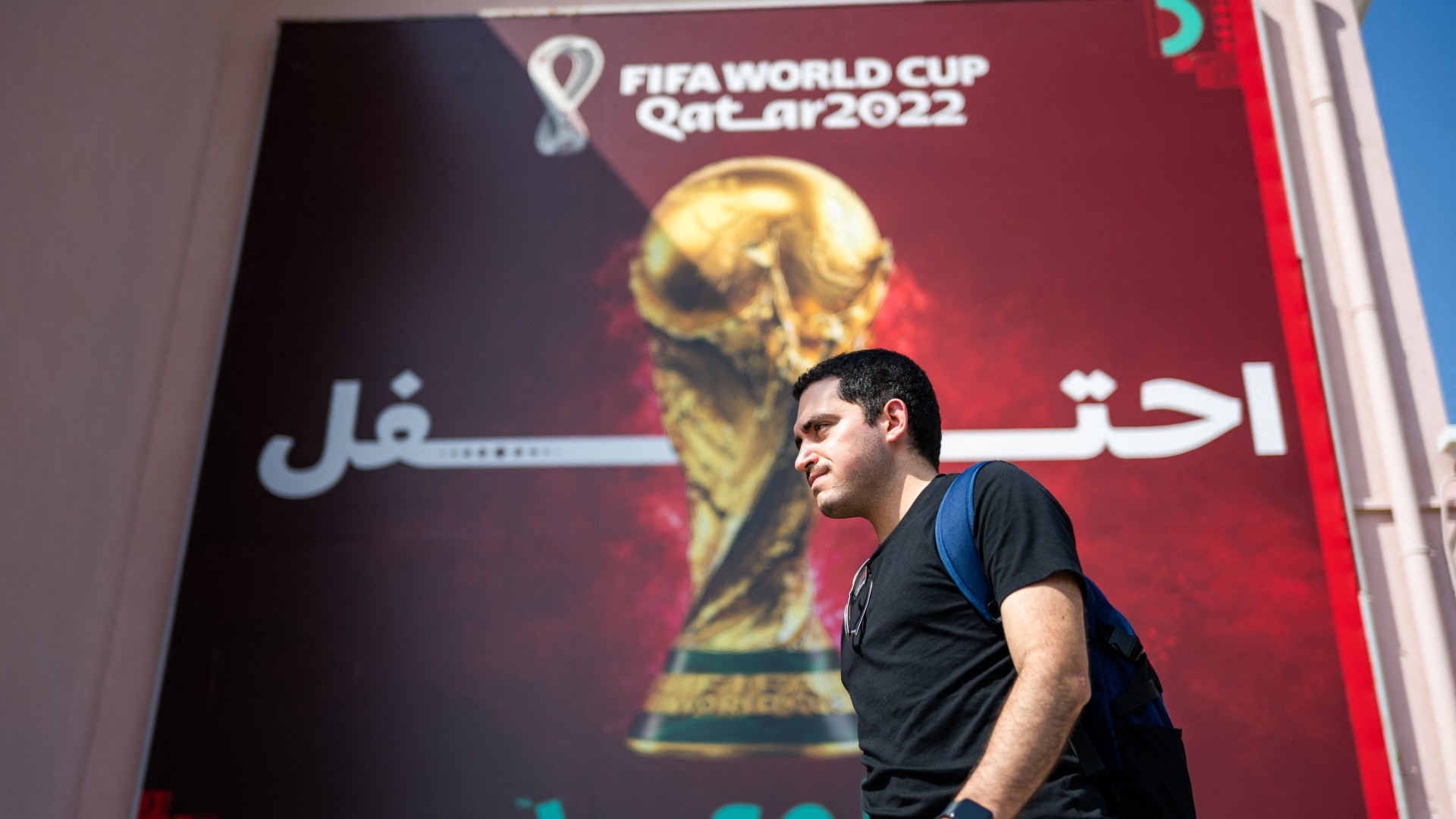
The World Cup in Qatar did not go according to the script, which had been written and distributed well before the first ball was kicked.
The script was carefully crafted in a different era, when two of Doha’s jealous neighbours had bent every sinew in an effort to stop the untameable emirate from getting the World Cup. Saudi Arabia and the UAE failed, despite a credulous western media that seemed not to question their briefers’ motives.
The script went as follows: the World Cup was dubiously if not corruptly procured by a statelet with no football record, a poor human rights record and draconian anti-gay laws. The charges were that the bidding process was dubious; that Qatar never properly accounted for the number of dead construction workers; and that Harry Kane was threatened with sanctions if he wore a rainbow armband.
The truth is that sportswashing works, and there is no keener launderette than the sporting world of Britain itself
But neither Qatar nor thousands of jubilant fans from Latin America, Africa and Asia followed this script. The football tournament was a global success. Thousands of sports fans from the Global South and East got visas, which they would have struggled to obtain if the cup had taken place on European or American soil. The venues and the transport system worked.
Qatar even managed to make the desert recede in the dark. For a month, downtown Doha actually looked like a pleasant, grassy, tree-lined, pedestrian-friendly park - not the pavement-less SUV racetrack it really is.
Yet this did not stop the Guardian, BBC, ITV, Telegraph, Times, and New York Times from all begrudging the tournament’s success - right up to the last minute when Lionel Messi donned that much-misinterpreted bisht.
'The wrong place'
The BBC boycotted the opening ceremonies on television (although as presenter Gary Lineker tortuously explained, it was available live on iPlayer, the BBC Sport website and Red Button). The Guardian opined: “It was a great World Cup, but its drama unfolded in the wrong place.” And the New York Times concluded that Qatar had spent its way out of trouble - a bizarre take for a media organisation so wedded to the concept that capitalism is the bedrock of democracy.
I don’t and cannot take issue with fellow journalists digging up dirt on Qatar, for the very reason that we have done it ourselves.
Since its inception, Middle East Eye has pursued human rights abuses around the region. We highlighted the abuses suffered by South Asian workers who make up 70 percent of Qatar’s population more than five years ago. Peter Oborne won an award for his coverage of the Saudi bombing of the Houthis in Yemen, at a time when Qatar was part of that doomed campaign.
This past December, Dania Akkad won an award for her investigation into the disappearance Noof al-Maadeed, a young Qatari woman who came to prominence online after highlighting her life under the emirate’s male guardianship rules and the years of domestic abuse and restrictions she faced. She offered advice to other Qatari women about how to escape, as she had done.
My only point is to ask whether the media organisations that shone such a bright light on Qatar’s undoubted failings on the safety of the foreign workers it employed to build such an event, would be willing to shine that light elsewhere on venues and clubs closer to home. Are standards that are so often presented as universal, applied universally?
Does the world neatly divide into rules-based democracies that respect basic human rights, and autocracies, sheikhdoms and military dictators who flout them? This is the assumption behind much of this coverage.
Russia's World Cup
Let us start by looking at media coverage of the previous World Cup in Russia in 2018. Did BBC television boycott the opening and closing ceremonies? There was plenty going on in Vladimir Putin’s Russia to worry them.
The tournament took place four years after Putin’s invasion of Crimea and Donbas, and 18 years after he first came to prominence as an unknown prime minister, one of many who passed through Boris Yeltsin’s presidency, by crushing resistance in Chechnya.
As the new boy on the Russian political stage, Putin vowed to wipe out Chechen fighters “in the shithouse”. The brave, and of course now late, investigative journalist Anna Politkovskaya gave the fullest account of the barbaric methods that Russian special forces used to quell the Chechen insurrection.
None of this put western leaders off. In fact, the situation in Chechnya encouraged former British Prime Minister Tony Blair and former US President George W Bush to adopt Putin as a partner in their “war on terror”.
In the late 1990s, Russian-American historian Yuri Felshtinsky teamed up with a disgruntled lieutenant colonel in the FSB, Russia’s federal security service, called Alexander Litvinenko. The result was a book called Blowing Up Russia, which listed in embarrassing detail the appropriation of power by Russian security forces and the FSB’s alleged involvement in false-flag terrorist acts against Russian citizens that were blamed on the Chechens.
Felshtinsky and Litvinenko continued to work on obtaining proof that the FSB was involved in the notorious flat bombings in September 1999 that were the pretext to launch the Second Chechen War. In 2007, investigator Mikhail Trepashkin alleged that the FSB had vowed “everyone involved in the publication of the book … would be destroyed”. Felshtinsky suggested that Boris Berezovsky’s death in London had not been a suicide; Berezovsky had sponsored the book. And we all now know Litvinenko’s fate.
Exercises in sportswashing
By the 2018 World Cup, Ramzan Kadyrov, the psychopath installed by Putin to subdue Chechnya, was conducting an anti-gay crackdown, which comprised detentions, beatings and humiliation of men presumed to be gay or bisexual. This did not seem to bother the BBC and ITV sports commentators who showed every sign of loving their time-limited immersion in Russian culture.
Please note that North Korean labourers endured “slave-like conditions” in the construction of World Cup venues in Russia, and more than a dozen workers died while building stadiums. At the same time, signifiant numbers of Russian football supporters used racist and neo-Nazi symbols and chants. You try being Black in Putin’s Moscow. None of this appeared to trouble the western journalists.
Since then, we in Britain have had the Saudi takeover of Newcastle United and the Emirati bid for Manchester United, both notable exercises in sportswashing. Did the BBC pursue questions around these developments with anything like the energy and persistence with which they went after Qatar in the run-up to the football tournament?
Palpably, on any of the counts that other non-western countries are judged, the US is not fit to host the World Cup
The distinction made by the Premier League between the Saudi sovereign wealth fund that funded the consortium that bought the club, and Saudi Crown Prince Mohammed Bin Salman, who despatched a kill squad on at least two known occasions to hunt high-profile Saudi dissidents, is politically and practically meaningless, as the Foreign Office would be the first to tell them.
Nothing moves in Saudi Arabia without it being approved by the crown prince, who micromanages everything with disastrous results. Lineker did tweet: “It’s long overdue that football had a fit and proper, ‘fit and proper person test’ for potential owners of football clubs. An independent regulator is probably the only way to do this.” But that was the extent to which the acquisition of Newcastle United was probed, and the club’s owners have been duly accepted into the ranks of the Premier League’s elite.
The truth is that sportswashing works, and there is no keener launderette than the sporting world of Britain itself. It worked with F1 racing and it works in Hollywood, too.
Invite Oliver Stone to the opening ceremony of the second Red Sea International Film Festival in Jeddah, and what you will soon get is a world-famous film director saying that the kingdom is “much misunderstood … people who have judged too harshly should come and visit to see for themselves”. By the way, it is illegal to be LGBTQ in the kingdom.
American abuses
But what about the next World Cup? I am waiting for someone to write that the US - which is co-hosting the 2026 tournament alongside Canada and Mexico - is not a fit and proper country to hold the event on human rights grounds alone. But I have a feeling I may be waiting for some time.
More than 145 anti-transgender bills were introduced across 34 states last year, the largest number in a state legislative session, according to the Human Rights Campaign (HRC). At least 32 transgender and gender non-conforming people were killed in the US last year, the HRC noted, adding to more than 600 LGBTQ people killed in the past two decades.
The HRC has said its figures are likely an undercount because the deaths of trans people often go unreported, or the victims are misgendered in police reports.
What about migrants? At least 853 migrants died in fiscal year 2022 trying to cross the US-Mexico border, making it the deadliest year for migrants recorded by the US government. Between 1998 and 2020, the US Border Patrol recorded more than 7,000 migrant deaths.
The Center for Immigration Studies, meanwhile, estimates that in January 2022, there were 11.35 million illegal migrants, and they form the vast majority of those who harvest foods in the US.
“Many undocumented farm workers have been toiling in the fields for years, pay taxes and have American children, yet enjoy few labor rights, have extremely limited access to occupational health services and live under the constant threat of deportation,” noted a Guardian report from May 2021.
And what about slavery, reparations for which the Economist has argued were “morally appealing but flawed”? According to Statista’s historical data, between 1501 and 1866, “it is estimated that the transatlantic slave trade saw more than 12.5 million African people forcefully put on slave ships and transported to the Americas. Of these 12.5 million, only 10.7 million disembarked on the other side of the Atlantic, meaning that approximately 1.8 million (14.5 percent) did not survive the journey, known as the Middle Passage.”
Double standards
What about the establishment of European settlers in the Americas? The numbers are staggering. Researchers at University College London have estimated that as many as 56 million indigenous people were killed by European settlers in South, Central and North America over a 100-year period. So much farmland was abandoned and reforested that it changed the global climate. To the white settlers, the indigenous tribes were standing in the way of progress and America’s manifest destiny.
When the US sets about killing people, it does so big-time. Brown University researchers estimated that at least 480,000 were killed in Iraq, Afghanistan and Pakistan, 244,000 of them civilians. US drone and air strikes alone have killed at least 22,000 civilians - and perhaps as many as 48,000 - since the September 11 terrorist attacks, according to Airwars.
And so on, and so forth. Palpably, on any of the counts that other non-western countries are judged, the US is not fit to host the World Cup.
The usual reply one gets when you assemble all these ugly facts in one place, is that they lack “context”. How fair is it to blame one generation for the sins of their fathers? Do we hold postwar Germany to account for the Nazis? Precisely, but do we look at a socially conservative Muslim country, and do we afford Islam, with the same context and nuance? Obviously, we do not.
In fact, attacks on immigrants and the LGBTQ community very much belong to the US today. There have been no reparations for slavery, although calls for them have grown in intensity. And the racial wealth gap remains large. More than 150 years after slavery was abolished, the US median wealth for white families was $188,200, compared with $24,100 for Black families, according to the Federal Reserve’s 2019 Survey of Consumer Finances.
Construction of the olympic village for the games that France will hold in 2024 is in the final stages. France has branded the games as the games of " social inclusion of refugees and asylum seekers". How curious to discover that illegal immigrants working on the site were instructed to hide by their employers when the inspectors came round.
Frankly, little has changed from those white settlers who thought it was their manifest destiny to kill native tribes.
Except for one thing: the reach of western liberal thinking is shrinking. The rest of the world, indeed most of the world, will dismiss the West’s indefatigable attempts to impose a hierarchy of nations and establish a system of penalties on those countries who are deemed as outcasts for what it is. Like it or not, the West has stopped being the model for the rest of the world to follow. Its time as the global mentor has passed.
The views expressed in this article belong to the author and do not necessarily reflect the editorial policy of Middle East Eye.
This article is available in French on Middle East Eye French edition.
Middle East Eye propose une couverture et une analyse indépendantes et incomparables du Moyen-Orient, de l’Afrique du Nord et d’autres régions du monde. Pour en savoir plus sur la reprise de ce contenu et les frais qui s’appliquent, veuillez remplir ce formulaire [en anglais]. Pour en savoir plus sur MEE, cliquez ici [en anglais].



